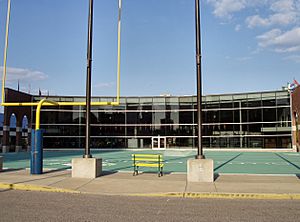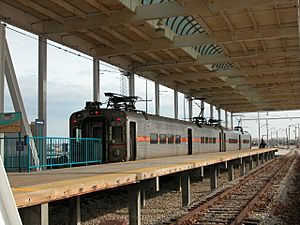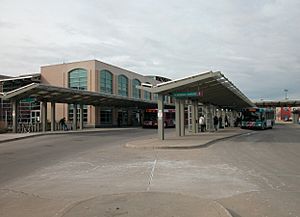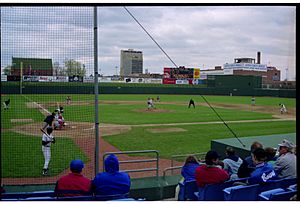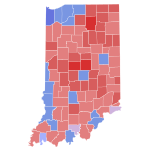Joe Kernan (politician) facts for kids
Quick facts for kids
Joe Kernan
|
|
|---|---|
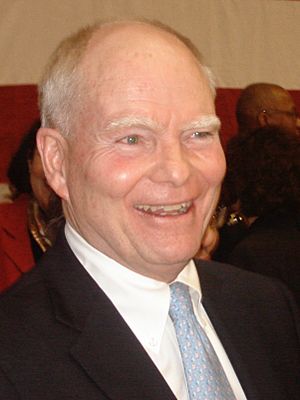
Kernan in 2008
|
|
| 48th Governor of Indiana | |
| In office September 13, 2003 – January 10, 2005 |
|
| Lieutenant | Kathy Davis |
| Preceded by | Frank O'Bannon |
| Succeeded by | Mitch Daniels |
| 47th Lieutenant Governor of Indiana | |
| In office January 13, 1997 – September 13, 2003 |
|
| Governor | Frank O'Bannon |
| Preceded by | Frank O'Bannon |
| Succeeded by | Kathy Davis |
| 30th Mayor of South Bend | |
| In office January 3, 1988 – January 3, 1997 |
|
| Preceded by | Roger Parent |
| Succeeded by | Steve Luecke |
| South Bend Controller | |
| In office January 1, 1980 – February 17, 1984 |
|
| Appointed by | Roger Parent |
| Preceded by | Peter Mullen |
| Succeeded by | Michael Vance |
| Personal details | |
| Born |
Joseph Eugene Kernan III
April 8, 1946 Chicago, Illinois, U.S. |
| Died | July 29, 2020 (aged 74) South Bend, Indiana, U.S. |
| Resting place | Cedar Grove Cemetery, Notre Dame, Indiana, U.S. |
| Political party | Democratic |
| Spouse | Maggie McCullough |
| Education | University of Notre Dame (BA) |
| Military service | |
| Allegiance | United States |
| Branch/service | United States Navy |
| Years of service | 1969–1974 (Active) 1974–1982 (Reserve) |
| Battles/wars | Vietnam War |
Joseph Eugene Kernan III (April 8, 1946 – July 29, 2020) was an American businessman and Democratic politician who served as the 48th governor of Indiana from 2003 to 2005. He previously served as the 47th lieutenant governor of Indiana from 1997 to 2003 under Frank O'Bannon and succeeded the governorship after O'Bannon's death. Kernan had also served nearly a year as a prisoner of war during the Vietnam War.
After graduating from the University of Notre Dame, Kernan joined the Navy in 1969. A naval aviator, he was shot down in North Vietnam and taken prisoner in 1972. After his release, Kernan continued on active duty through 1974. A member of the Democratic Party, Kernan served as Mayor of South Bend, Indiana, and then as the 47th lieutenant governor of Indiana from 1997 to 2003. He became governor on September 13, 2003, upon the death of Governor Frank O'Bannon. He lost an election to serve a full term as governor to former Office of Management and Budget director Mitch Daniels on November 2, 2004. Kernan returned to South Bend and retired from politics. As of 2025, he is the most recent governor of Indiana from the Democratic Party.
Contents
Early life and education
Joe Eugene Kernan III was born in Chicago, Illinois on April 8, 1946. He was the eldest of nine children.
Kernan's father, Joseph E. Kernan Jr. (1923 - 2008), was a naval aviator during World War II and would go on to have a career in government service. His mother, Marian Powers Kernan (1922 - 1998), held a variety of jobs, including a tenure C&P Telephone, where she worked her way up to a communications representative. As a communications representative she handled The Pentagon's account, and held security clearance.
Kernan's father was the unsuccessful Democratic nominee in 1963 fortthe 4th district seat on the South Bend Common Council, and in 1964 ran unsuccessfully for St. Joseph County commissioner.
Kernan's family moved to South Bend when he was ten years of age. Kernan graduated from St. Joseph High School in South Bend in 1964.
He graduated in 1968 with a degree in Government from the University of Notre Dame. Kernan played on the university's baseball team, serving as a walk-on on the freshman team, and playing for the varsity team his sophomore and junior years in 1967 and 1968. He was initially an infielder, later switching to catcher in his junior year.
Military service
Kernan joined the United States Navy in 1969, and served as a Naval Flight Officer aboard the carrier USS Kitty Hawk. After he completed Naval Flight Officer training, reconnaissance training, & RA-5C Vigilante Replacement Air Group training, he served with RVAH-7 at Naval Air Station Albany, Georgi, until deploying to Southeast Asia aboard the aircraft carrier USS Kitty Hawk, where he served (flying 26 missions over Laos and North Vietnam) from February 1972 until a two-seat fighter plane he was serving as a weapons officer on was shot down by enemy forces while on a reconnaissance mission over North Vietnam and Kernan was detained as a prisoner of war on May 7, 1972. He was held as a prisoner of war for 11 months.
For part of his time as a prisoner of war, Kernan was imprisoned Hỏa Lò Prison, however he spent most of his sentence at a nearby prison dubbed "The Zoo". Kernan was repatriated on March 27, 1973 and continued on active duty with the Navy until December 1974. Kernan received the Distinguished Flying Cross, two Purple Hearts and the Navy Commendation Medal.
Early career
Kernan served as a business manager and executive at several companies.
In 1975, after having completed his Naval service, Kernan worked for Procter & Gamble in Cincinnati, supervising the manufacturing of Camay, Safeguard, and Zest products. He then returned to South Bend, where he worked for South Bend Community Schools and later for the Schwarz Paper Company.
Kernan began his career in government by working for a month in the office of South Bend controller Peter Mullen for a month in 1976 on a special project related to license research.
South Bend Controller
Kernan served South Bend controller from 1980 to 1984. He was appointed to the position by mayor Roger Parent quickly after Parent took office on January 1, 1980. Kernan had been recommended to Parent by Peter Mullen, who held the position before Kernan.
As controller, Kernan served as an ex officio member of the Board of Public Works, and the water and sewage boards.
Kernan was tasked with overseeing the drafting of the city's $40 million annual budget. While in this office, cuts were made in regards to the number of the police and firemen, which he later stated were necessary due to the budget squeeze caused by a state tax freeze and cuts in federal aid. When Kernan left the post, Mayor Parent praised Kernan's work on the budget, claiming that Kernan took the job at the city's worst financial time and that, "just putting a budget together and making it work is an accomplishment, and Joe did a good job".
Kernan negotiated contracts for city employees, including contracts for the police and fire department workforces. He also negotiated contracts with Teamsters.
Kernan left the office on February 17, 1984 in favor of private sector employment, announcing on his last day in office that he would be working as a vice president for the McWilliams Corporation. He was succeeded in office by Michael Vance.
Following his tenure as South Bend Controller, Kernan returned to the private business sector, serving as vice president and treasurer of MacWilliams Corp until he ran for mayor in 1987.
South Bend mayoralty
Kernan was elected serve as mayor of South Bend as the Democratic Party nominee in the 1987 election, and was subsequently reelected as the Democratic nominee in the 1991 and 1995 mayoral elections. In 1995, he won 82% of the vote, a record for South Bend mayoral elections. He was the first mayor of the city to win a third term since 1905. Kernan was the longest-serving mayor of South Bend, until his tenure was surpassed in length by that of his immediate successor Steve Luecke.
Kernan was regarded to be a popular mayor. In November 1996, Nancy Armour of The Associated Press wrote that Kernan was, "well-liked by Democrats and Republicans alike. He's friendly and warm, quick to greet residents by name and ask how they are doing. He's accessible too."
As mayor, Kernan worked on long-term job creation efforts, made efforts to improve public safety, and strengthened the finances of the city. After being reelected to his third term, Kernan stated that his priorities, at that time, were public safety, economic development, and neighborhoods.
Development
At the time he was mayor, Kernan was praised for his ability to attract economic development to the community. Among the major developments he was able to garner South Bend was the securing of the city as the location for the College Football Hall of Fame. Kernan had been instrumental in getting South Bend selected over 89 other cities as the site for the College Football Hall of Fame. Kernan originally pledged that city funds would not go towards the project, and that it would be funded by corporate donations. However, after the city was only able to raise under $2 million in corporate donations, the city issued municipal bonds to pay for the construction.
Among the developments of which Kernan was particularly supportive was the Blackthorn development, a multimillion-dollar golf course and office park development. In 1992, he had touted the concept that became Blackthorn as a "pump for future development." In 1995, Kernan took interest in a proposal to build an arena in South Bend for a new minor league ice hockey team. However, this proposal ultimately failed to materialize.
Some of the developments that were initially regarded as successes for South Bend when Kernan was mayor ultimately fell short in the long run. For instance, the College Football Hall of Fame never met its initial attendance projections. By the late-90s, it already had begun to be criticized as a failure, due to a lack of corporate sponsorship and poor turnout even during special events. The Hall of Fame would ultimately leave South Bend for the city of Atlanta in the 2010s. The Blackthorn, particularly its golf course component, fell short of expectations as well. However, Kernan, as late as 2015, defended the Blackthorn development, having regarded it, personally, to have been a success.
Job creation and retention
Kernan worked on long-term job creation efforts as mayor. Kernan came to office shortly after a number of companies had left the city or closed, such as South Bend Toy in 1985 and Wheelbrater-Frye. Kernan took credit for stopping companies like Allied Products' South Bend Stamping from leaving the city. He also took credit for attracting other jobs to the city, arguing that as mayor he had been able to create or retain 4,000 manufacturing jobs. Another example that illustrates Kernan's work in this area was his successful work in 1993 to keep the Hoosier Lottery's 15-employee regional headquarters in South Bend. After they began looking for a new location, eying sites outside of South Bend, Kernan worked directly with them to find a new location for their offices within the city.
Infrastructure
The loss of $20 million annually in federal funds which the city had received prior to Reagan and Bush budget cuts to urban programs had taken its toll on South Bend's infrastructure. Nevertheless, a number of infrastructure projects took place under Kernan's mayoralty.
Among the infrastructure projects that took place during Kernan's tenure as mayor was the shifting of South Bend's South Shore Line station from a facility shared with Amtrak to a new location at the city's airport, which opened in 1992. In 1993, Kernan testified before congress that this move had been partially responsible for a 73% increase in ridership from South Bend, attributing this to the fact that the previous location of the station was in an area, "isolated and very difficult and perceived to be unsafe" Plans to move the South Shore Line station to the airport, creating an air, bus, and rail intermodal terminal, had dated back to the 1970s.
Kernan and others would work to see a new intermodal transit center built in Downtown South Bend, which would feature a new station for Amtrak and a new transit center for South Bend Transpo. Efforts planning this station date back to 1992. It ultimately opened in 1998, after Kernan's mayoralty had ended, as the South Street Station, but only as a bus center without an Amtrak component.
Parks and Recreation
During Kernan's tenure many changes were made to South Bend's parks. Several new facilities opened, including Blackthorn Golf Course in 1994. In 1993, for the first time, non-reverting funds were established to create money for capitol improvements to the parks. Additionally, a City-County parks merger was studied in 1993, but ultimately not implemented. In 1995, South Bend's recreation commission was dissolved, and the Department of Parks took over management of recreation programs and was renamed the Department of Parks and Recreation.
National politics
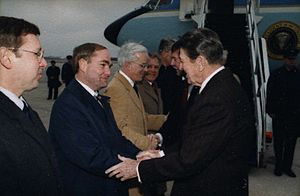
In 1989, Kernan considered, but ruled out, running against Republican Dan Coats for the United States Senate in the 1990 special election for the seat that had vacated by Dan Quayle upon becoming vice president. While Kernan was considered a strong prospective candidate among the possible Democratic contenders, commentator James Grass observed prior to Kernan making his decision not to run that, "to run a successful campaign," a Democratic nominee would likely need, "statewide name recognition, a good reputation, and the ability to raise lots of money. All the Democrats still considering a candidacy lack at least one of these qualifications."
In 1992, Democratic presidential nominee Bill Clinton proposed a $200 billion ($20 billion annually) plan for infrastructure. Mayor Kernan declared to the media that under Clinton's plan, in which a city of South Bend's size would have received at least $5 million annually, South Bend would have been able to complete critical road construction and complete reclamation on hundreds of acres of former industrial property.
In 1993, Kernan campaigned in support of President Clinton's deficit reduction and economic stimulus proposal. After meeting with Clinton when accompanying Governor Evan Bayh to the Democratic Governors Association quarterly meeting in March 1993, Kernan declared that he had been persuaded by Clinton that it was necessary to pass both deficit reduction and economic stimulus in a singular piece of legislation rather than separating them into separate bills.
To promote the legislation to Indiana's federal representatives and their constituents, Kernan pointed to an analysis that had found that Indiana would be one of only five states that would benefit fiscally from the proposal, as Indiana, at the time, had typically received less in federal funding than it contributed in federal taxes. Kernan also touted the prospect of South Bend receiving sever million dollars in one-time federal funding through the legislation. He also argued that the stimulus portion of the legislation was needed to generate jobs.
Kernan also argued that it was past time for legislators to cease considering alternative proposals, as several Republican alternative proposals had already been voted down. Kernan remarked, "This is the only game in town. While there may be some folks who disagree with some party of it, it's the only economic package in the country that has a change of passage." He argued that failure to pass the proposal without a viable alternative would worsen federal legislative gridlock and hurt the chances of Clinton achieving his target of implementing a significant economic change.
Other matters
As mayor, Kernan worked to create a better working relationship between South Bend and the nearby University of Notre Dame.
In December 1988, a fire that destroyed the Morningside Club Residence, an apartment hotel, displaced more than a hundred residents. Kernan was able to persuade the then-unopened Center for the Homeless to rush its opening in order to accommodate some of these displaced residents.
In 1988, taking advantage of a decline in interest rates, Kernan refinanced Coveleski Stadium through the newly created South Bend Redevelopment Authority.
Kernan instituted a mayor's night out/mayor's night in to provide an opportunity for his constituents to better meet with him and share their concerns with him. He held his first such event in January 1988. This practice was also continued under his successor, Steve Luecke.
Kernan was involved in the creation of Indiana's Vietnam and Korean War memorials.
1996 election as lieutenant governor
In 1996, Kernan was elected as Indiana's lieutenant governor on the Democratic Party ticket with then-lieutenant governor Frank O'Bannon topping the ticket as the gubernatorial nominee. Kernan had been reluctant to accept O'Bannon's offer to run with him, initially desiring to instead continue to serve as mayor. Others who had been rumored to have under consideration by O'Bannon for a running mate included Tom DiGuillio, Mike Gery, Baron Hill, John Walda, and Jill Long Thompson. Pamela Carter had ruled herself out of consideration. There has been some reporting that O'Bannon may have first offered the running mate position to Long Thompson and that she had rejected.
Kernan, the mayor of a Northern Indiana city, brought geographic balance to the ticket headed by O'Bannon, a native of the Southern Indiana city of Corydon. O'Bannon had previously signaled that he was exploring choosing a running mate from Northern Indiana in order to provide that geographic benefit. Kernan and O'Bannon had a strong preexisting acquaintanceship. O'Bannon had developed a working relationship on issues of economic development since O'Bannon oversaw the Indiana Department of Commerce as lieutenant governor. Kernan had developed a particularly strong camaraderie with O'Bannon six years earlier in 1990, when Kernan and other Indiana mayors accompanied O'Bannon on a trade mission to Poland, Soviet Union, Ukraine, and Yugoslavia. O'Bannon's selection of Kernan was announced June 3, 1996 with a press release followed by press conference in South Bend and Indianapolis. in its press release, the gubernatorial campaign promoted Kernan as having had a record of success in attracting businesses to the city of South Bend.
While campaigning for lieutenant governor in 1996, Kernan continued to fulfill his duties as mayor. In part to facilitate this, Kernan operated his end of the campaign out of a separate campaign office from O'Bannon, located in South Bend. Despite starting the general election as underdogs, O'Bannon and Kernan's ticket to defeat overcame a deficit to defeat the Republican ticket of Steve Goldsmith and George Witwer.
Upon being elected Lieutenant Governor, Kernan was involved in the process of helping guide the selection of a successor for mayor. Kernan involved St. Joseph Democratic Party Chairman Butch Morgan and South Bend City Council President Roland Kelly in the interviewing of prospective successors. By law, his successor was appointed by the city's 120 Democratic Party precinct committeemen and committeewoman, and it was required that a successor be appointed within thirty days of Kernan leaving office as mayor. It was anticipated that Kernan's endorsement would be heeded by them. Kernan ultimately endorsed Steve Luecke to be his successor, and Luecke was thereafter voted unanimously to serve the rest of Kernan's term. Other candidates that had been reportedly considered included St. Joseph County Prosecutor Mike Barnes, Portage Township Assessor John Voorde, St. Joseph County Auditor Joe Nagy, City Councilor Sean Coleman, City Councilor John Hosinski, Carter Wolf, and City Controller Kevin Horton.
Lieutenant governorship
From January 1997, until assuming the governorship in September 2003, Kernan served as lieutenant governor of Indiana. As lieutenant governor, Kernan built a reputation as a skilled orator. Kernan was regarded to be a popular lieutenant governor.
First term
Kernan was sworn-in as lieutenant governor by his own father. As lieutenant governor, Kernan served as the President of the Indiana Senate, the Director of the Indiana Department of Commerce, and as the Commissioner of Agriculture.
In 1998, Kernan headed the Insurance Industry Working Group, a group aiming to boost the economic fortunes of the state's insurance industry. The group succeeded in getting a reduction to the insurance premium tax rate, securing the passage of a new demutualization law, and getting Ivy Tech to create a new associate degree focusing on the insurance industry.
In 1998, Kernan was involved in the formation of the Pork Crisis Working Group, which later became Agricultural Crisis Working Group. Kernan chaired this group.
In 1998, Kernan was made chair of the new Hoosier Farmland Preservation Task Force. It presented recommendations for farmland preservation and additional land use issues to O'Bannon and members of the Indiana General Assembly, and Laos provided information and advice to communities dealing with problems regarding these issues.
During Kernan's tenure at the head of Indiana's Department of Commerce, the state recorded what were the second-highest export numbers in its history in the second quarter of 1998.
In 1999, Kernan launched the Veterans Outreach Initiative, which was an effort to urge veterans to capitalize upon state and federal benefits available to them.
Kernan was the chairman of the Indiana 21st Century Research and Technology Fund, which was formed in 1999.
Second term
O'Bannon and Kernan were re-elected in 2000, defeating the ticket of David M. McIntosh and J. Murray Clark.
In October 2001, Kernan unveiled the O'Bannon administration's plan for a comprehensive overhaul to the state of Indiana's tax system. The plan was entitled the 21st Century Tax Plan. Kernan had developed this plan alongside a bipartisan group of tax experts. A tax reform plan based upon this proposal was passed in the Indiana General Assembly in June 2002.
In July 2002, Kernan announced a reorganization of the Indiana Department of Commerce. It moved from dividing the department in the thirteen divisions to instead dividing into two teams (program operations and professional services). The reorganization also included the creation of twelve regional offices (including a central office in Indianapolis).
In December 2002, O'Bannon and Kernan proposed a broad job-creation plan entitled "Energize Indiana".
In 2002, a rift arose between Kernan and Governor O'Bannon over O'Bannon's selection of Peter Manous as Democratic State Chairman.
Acting governor
On September 10, 2003, Kernan began serving as acting governor. O'Bannon had been hospitalized after suffering a stroke two days earlier. This was the first time that Indiana had ever implemented their state constitution's clause for handing over the authority of governor in the instance that the governor is unable to perform their duty due to disability. Speaker of the Indiana House of Representatives B. Patrick Bauer and Indiana Senate President pro tempore Robert D. Garton had consulted with O'Bannon's counsel, medical treatment team, and family before making a request on September 10, 2003 to Indiana Supreme Court Chief justice Randall Shepard for the court to issue a ruling on O'Bannon's ability to perform his duties. After just over an hour of private discussion, the court ruled that Kernan would become acting governor.
Governorship
Kernan assumed the governorship following the September 13, 2003 death of Frank O'Bannon. Kernan would receive praise for what was regarded to have been a smooth transition into the office.
Appointments and personnel
For his lieutenant governor, Kernan appointed Kathy Davis, making her the first female lieutenant governor in Indiana's history.
Early into his governorship, Kernan made some key hires and appointments. This included hiring Marshall Michael Carrington to conduct a thorough probe of the Indiana Bureau of Motor Vehicles, and appointing Cheryl Sullivan to head the Family and Social Services Administration. Kernan was credited with strengthening the cabinet style of government of Indiana's executive branch, which had dissipated in its functionality in the later years of O'Bannon's tenure.
Economic matters
Kernan assumed office amid an economic downturn in the state, with state revenue decreasing and unemployment rising. During his governorship, the state struggled with budget deficits and job losses, which Republicans faulted Kernan for, but which Democrats blamed on the lingering aftermath of the early 2000s recession and the dot-com bust. In 2004, the Indiana Fiscal Policy Institute (IFPI) found that the state was facing a $824.3 million structural deficit, a deficit equivalent to more than 7% of the state's existing revenues, with the deficit anticipated to significantly grow every year under the existing budget priorities. On a positive note, in 2004, the state began to experience notable increases in revenue in mid-2004.
In November 2003, Kernan and Davis unveiled the Opportunity Indiana initiative, which would aim to optimize how the state conducts business and would aim to increase opportunities for Indiana companies. Under this program, they created a working group to review how the state of Indiana deals with purchasing goods and services, and to provide recommendations to adjustments.
In his 2004 State of the State address, Kernan outlined the Indiana@Work program, an expansion of the state's new jobs initiative. By the end of 2004, 30,000 Hoosiers would receive skills assessments through this program.
Education
In January 2004, Kernan announced the Early Learning Trust, which was an initiative with the goal of providing every child in Indiana with access to voluntary full-day kindergarten by the year 2007. It would also create pilot programs for early learning opportunities for at-risk children.
In March 2004, Kernan requested to the state's public colleges and universities that they cap tuition and fee increases at 4% for the 2004–05 academic year. In October 2004 he unveiled plans to expand the state's community college system from having ten campuses to having 23 in time for the fall of 2005, which would mean that every state resident would live within a 30-mile radius of a community college's campus.
Through executive order, Kernan created the Early Learning and School Readiness Commission.
As co-chair of the Indiana Education Roundtable, Kernan took charge in work to adopt the P-16 Plan for Improving Student Achievement.
Healthcare
Kernan took actions as governor to address rising healthcare costs. Changes were made to HoosierRx to allow senior citizens twice the discount when it was utilized in conjunction with the new federal Medicare prescription drug benefit. Kernan signed legislation which created the state's prescription drug purchasing pool. Kernan pushed forward with the Hoosier Health Plan. On December 1, 2004, Kernan convened a prescription drug summit aiming to develop an "Indiana solution" to drug affordability concerns.
Highway infrastructure
Kernan supported a controversial project extending Interstate 69 from Indianapolis to Evansville, which had earlier received O'Bannon's support. Kernan also pursued upgrades to U.S. Route 31. The Indiana Department of Transportation estimated that Kernan's proposed projects for U.S. Route 31 would cost more than $1 billion.
Other matters
In his 2004 State of the State address, Kernan announced the Peak Performance Project, in which he delegated lieutenant governor Davis with overseeing a review of state government performance. The Peak Performance Project would ultimately result in the creation of a broad plan for overhauling the state's government.
In 2004, Kernan became the first governor of Indiana in 48 years to spare the life of an inmate on death row, when, just days before his scheduled execution, Kernan commuted the sentence of Darnell Williams to life in prison without parole.
Campaign for a full term
In December 2002, whilst lieutenant governor, despite previous widespread anticipation that he would seek the governorship, Kernan made the surprise announcement that he would not run in the 2004 election. However, two months after assuming the governorship, he reversed this decision, declaring himself a candidate.
In their bid for a first full term as governor and lieutenant governor, Kernan and Davis outlined their vision for what he would seek to accomplish in their prospective continued tenure in the state's top two offices in a plan entitled "Action Indiana". Kernan and Davis were ultimately defeated by the Republican ticket of Mitch Daniels and Becky Skillman. At the time, the election was the most expensive gubernatorial election in the state's history, in regards to campaign spending. The Republicans have controlled Indiana's governor's mansion since Kernan's departure.
One of the things Kernan criticized his opponent, Daniels, for was Daniels' decision in 2000, as a member of the board of the Indianapolis Power & Light Company, to vote to sell the utility company to an out-of-state company. Kernan characterized it as "terribly bad judgement".
Kernan pledged to pursue upgrades to U.S. Route 31 calling it, "one of my top priorities since I first took office as lieutenant governor in 1997, and...still among them today." He declared that there had progress in the pursuit of improvements, and that the plans had been made in a "fiscally responsible manner" Kernan also voiced opposition to the prospect making the thoroughfare a toll road, declaring, "I will not make hoosiers – or the people who are driving through on business or pleasure – pay a toll to travel this roadway." Daniels criticized Kernan's proposals, characterizing them as fiscally irresponsible, claiming, "The gap between the cost and the available funds in the Indiana Department of Transportation's budget is more than $3 billion in the next six years. For a state that is broke by every measure, the governor's promise list is impossible."
Post-gubernatorial career
Kernan returned to private life in January 2005, and moved back to South Bend in 2006.
He served as a volunteer acting director for the St. Joseph County Red Cross. He worked at the University of Notre Dame as an adjunct professor.
Kernan served on the Indiana University South Bend Chancellor's Advisory Board, and was a member of the Chancellor's 100 of Indiana University.
Partnering with his gubernatorial successor, Kernan worked with the Mitch Daniels Leadership Foundation.
Kernan was the president and owner of the community and business development consulting firm South Bend Enterprises, Inc.
South Bend Silver Hawks
In 2005, Kernan became president and managing investor of the South Bend Silver Hawks baseball club, after convincing approximately 50 others to invest in the team. This kept the team in South Bend, amid rumors that they were eying a move out of the city.
Kernan's tenure with the South Bend Silver Hawks team ended in 2011. Kernan then agreed to sell the team to Andrew Berlin, of Berlin Packaging, so that he could develop the Silver Hawks further and keep the team in the South Bend area. The team has subsequently been the renamed the South Bend Cubs.
Honors and awards
For his military service, Kernan was awarded the Distinguished Flying Cross, two Purple Hearts and the Navy Commendation Medal. He was among the second-ever class of inductees into the Indiana Military Veterans Hall of Fame when he was enshrined in 2015.
Kernan was awarded an honorary doctorate by his alma mater the University of Notre Dame in 1998, when he served as the university's commencement speaker. In 2012, the Notre Dame Monogram Club awarded Kernan the Edward “Moose” Krause Distinguished Service Award. Six years later, the University of Notre Dame Alumni Association presented Kernan with the Rev. Edward Frederick Sorin, C.S.C., Award, regarded to be one of the university's highest honors.
A park in South Bend was named for Kernan in 2017. The park, located along the St. Joseph River, had previously been named Viewing Park. That same year, Kernan received an honorary doctorate of Humane Letters from Indiana University.
Personal life
Kernan was the eldest of nine children. He had one brother and seven sisters.
Kernan married Maggie McCullough in April 1974. Since 1976, they resided on the north side of South Bend, Indiana, where Maggie works as a marketing specialist for 1st Source Bank. Maggie is a Purdue University graduate and was active in community service.
Kernan was Catholic.
Kernan and his wife never had any children.
Kernan was diagnosed with Alzheimer's disease several years before his 2020 death. However, his family did not disclose his condition until early July 2020, weeks before his death, when they disclosed that Kernan was afflicted by the condition, was living in a care facility, and had lost his ability to speak.
Death
Kernan died on July 29, 2020, from complications of Alzheimer's disease at a care facility in South Bend.
Political positions
As governor, Kernan was not opposed to providing special subsidies for large employers to move jobs to the state. He responded to criticisms of this feeding into a race to the bottom by declaring, "I understand the argument that taking jobs away from Boston and putting them here is nationally a zero-sum game. But Indiana, like virtually every other state, is not going to unilaterally disarm".
In 2017, along with Republican former Ohio Governor Bob Taft, Kernan co-authored an op-ed arguing in favor of abolishing the death penalty for mentally ill criminals.
Electoral history
Mayor
| Party | Candidate | Votes | % | |
|---|---|---|---|---|
| Democratic | Joe Kernan | 17,030 | 53.00% | |
| Republican | Carl Baxmeyer | 15,104 | 47.00% | |
| Total votes | 32,134 | 100 | ||
| Party | Candidate | Votes | % | |
|---|---|---|---|---|
| Democratic | Joe Kernan (incumbent) | 16,134 | 76.49% | |
| Republican | Sylvia Shelton | 4,958 | 23.51% | |
| Total votes | 21,092 | 100 | ||
| Party | Candidate | Votes | % | |
|---|---|---|---|---|
| Democratic | Joe Kernan (incumbent) | 14,309 | 82.17% | |
| Republican | Mike Waite | 3,106 | 17.84% | |
| Total votes | 17,415 | 100 | ||
Lieutenant gubernatorial
| Party | Candidate | Votes | % | |
|---|---|---|---|---|
| Democratic | Frank O'Bannon/Joe Kernan | 1,087,128 | 51.52 | |
| Republican | Stephen Goldsmith/George Witwer | 986,982 | 46.78 | |
| Libertarian | Steve Dillon/Leona McPherson | 35,805 | 1.70 | |
| Party | Candidate | Votes | % | |
|---|---|---|---|---|
| Democratic | Frank O'Bannon (incumbent)/Joe Kernan (incumbent) | 1,232,525 | 56.56 | |
| Republican | David M. McIntosh/J. Murray Clark | 908,285 | 41.68 | |
| Libertarian | Andrew Horning/Mark Schreiber | 38,458 | 1.76 | |
Governor
| Party | Candidate | Votes | % | |
|---|---|---|---|---|
| Republican | Mitch Daniels/Becky Skillman | 1,302,912 | 53.21% | |
| Democratic | Joe Kernan (incumbent)/Kathy Davis (incumbent) | 1,113,900 | 45.49% | |
| Libertarian | Kenn Gividen/Elaine Badnarik | 31,664 | 1.29% | |
| Write-ins | 22 | 0.00% | ||
| Majority | 189,012 | 7.72% | ||
| Turnout | 2,448,498 | 57% | ||
See also
- List of governors of Indiana
- U.S. prisoners of war during the Vietnam War


